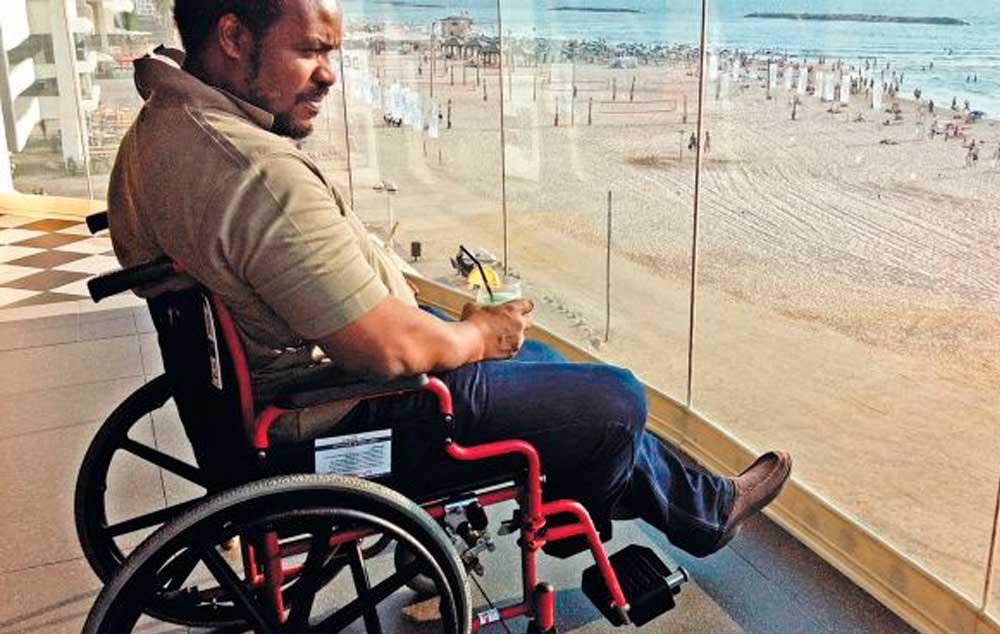
Israeli hotels ill-equipped to serve disabled guests
When Consuelo Endara planned her dream trip to Israel last May, she relied on a tour company that caters to wheelchair users like her to handle her transportation and hotel arrangements.
Everything went smoothly until Endara, 49, who suffered from polio as an infant in her native Ecuador, checked into what was advertised as a handicap-accessible hotel room in Jerusalem, only to discover that she could not enter the shower in her wheelchair because of a small step.
“I asked if there was a way to solve this problem, and they said we can remodel, but you have to pay,” Endara said. In the end, she told Haaretz, she agreed to spend several hundred shekels to have the step removed because “it was really difficult for me to find a place in which to stay at a price I could afford in the area that I needed.” She was quick to add that the hotel staff went out of their way to make her feel comfortable.
The management of the hotel in question, Jerusalem’s Chen Hotel, acknowledged that it asked Endara to cover the cost of the renovation, noting that its room complied with regulations and that it need not have agreed to alter it in any way.
The predicament in which Endara found herself exemplifies what academics and advocates for the disabled call a troubling incongruity in Israel’s tourism infrastructure: Even as the government has invested millions of shekels in recent years toward making museums, religious sites and other public places in Israel more accessible, most hotels are ill-equipped to meet the diverse needs of handicapped guests.
“Every disabled person is different, so saying that a hotel room is accessible doesn’t mean anything,” said Yuval Wagner, founder and chairman of Access Israel, a nonprofit organization that advises businesses on accessibility issues. “You have to make sure you provide detailed information about the level of accessibility, and that is something that most, if not all, hotels in Israel lack.”
There are no statistics about how many of the more than 50,000 rooms in the country’s 350 listed hotels even qualify as accessible, so Access Israel has undertaken a telephone survey to determine an accurate count. Results of an earlier, more limited survey are already available on the organization’s Hebrew-language website.
Meanwhile, Wagner advises physically-disabled tourists to ask questions before booking a room designated as accessible, and to conduct a “full investigation” of the room (and of public areas like the restaurant and pool ) before settling in, since hotel staff cannot always be trusted to provide accurate accessibility information.
Fewer options exist for disabled tourists on budgets and for those traveling in groups, said Eli Meiri, founder and general manager of Israel4All, the company that booked Endara’s Jerusalem hotel room.
“Most of the [mid- to high-end] hotels have at least two accessible rooms, but most budget hotels don’t have any,” said Meiri. “Not everybody can go to a [high-end] hotel, so it’s a problem.”
Hotels built since 1995 are mandated by law to include a set number of accessible rooms based on the total number of rooms, according to Penina Ben David of the Israel Hotel Association. However, most hotels were built before 1995 or have received exemptions because of space constraints or historic status. Ben David said the Knesset is considering a bill that will require all public buildings to meet certain accessibility standards by 2017.
Prof. Arie Reichel of the Department of Hotel and Tourism Management at Ben-Gurion University has studied the many challenges that disabled people face in the hotel environment, including staff attitudes.
“I was surprised to find out that not enough instruction or orientation is supplied to hotel employees about people with disabilities,” said Reichel, who co-authored an award-winning study on hotel experiences of people with physical disabilities. The study was published last year in the International Journal of Contemporary Hospitality Management. It focused on the experience of 45 Israelis who were either blind, wheelchair-bound or dependent on crutches, at both Israeli and international hotels. The study estimates that between 10 and 20 percent of Israelis are disabled in some way.
A humiliating experience
Several of the study’s participants reported that hotel employees related to them as if they were intellectually inferior or hard of hearing, addressing questions to their companions instead of directly to them.
“A common complaint was that ‘we are treated like retarded people,'” Reichel said. “This could be a very humiliating experience.”
Nissim Azaria, a disabled Israeli man who did not participate in the study, attributes this behavior to the lack of exposure to people with disabilities. “Most people don’t grow up around handicapped people, so the first time they see us they don’t know how to take us,” said Azaria, who was partially paralyzed by polio in the 1950s. “We are like a monster to them.”
Wagner, of Access Israel, noted that tapping the “disabled market” could prove profitable for the hotel industry, as disabled people almost always travel with a support network of family members and friends.
“I always say to business people and to hotel owners: look at accessibility as an investment,” Wagner said. “You spend money and you see it returned back to you.”
Prof. Yaniv Poria, who co-authored the Ben-Gurion study with Reichel and Yael Brandt, said that certain room improvements can be carried out quickly and at minimal cost. These include installing handles in the bathroom, lowering switches and appliances, and replacing hotel room doors with lighter models.
“Sometimes a small change can have a big impact on the hotel experience,” Poria said.
The largest hotel chain in Israel, Fattal, has taken a pro-active approach with regard to disability access. Each of its 30 hotels – including the Herods and Leonardo brands – is equipped with two or more accessible rooms, and the chain’s website includes detailed accessibility information in both English and Hebrew. A spokesperson said that hotel employees “receive training and learn to meet the needs and expectations of guests, including those with special needs.”
On a recent afternoon, Segun Abdurafiu was checking out of the Herods Tel Aviv, where he had stayed in one of the hotel’s four accessible rooms. Abdurafiu, 41, who was visiting from Nigeria, said he had been “treated with the utmost care and respect” during his stay.
Ben David, from the Hotel Association, said that people with physical disabilities tend to receive better service at hotels than in any other setting in Israel. “Still, it’s not enough,” she said. “Within five years, the situation should be different.”
For Joseph Baum, an American Jew who suffers from spinal problems and uses a power chair, five years seems like too long to wait. “As much as I would love to visit Israel, and I feel it is a must before my health deteriorates even further, it is imperative conditions improve,” Baum wrote in an e-mail. “I do not want to repeat year after year ‘Leshanah Haba’a B’Yerushalayim’ (Next year in Jerusalem ). I want to visit this year..”
Source: HAARETZ
Compartilhe
Use os ícones flutuantes na borda lateral esquerda desta página
Siga-nos!
Envolva-se em nosso conteúdo, seus comentários são bem-vindos!
Artigos relacionados
Acessibilidade no ESG. Equipotel aborda o tema para o turismo.
Acessibilidade no ESG, para o mercado do turismo. Equipotel aborda a importância da inclusão da pessoa com deficiência.
Morte Sobre Rodas. Filme inclusivo foi candidato ao Oscar.
Morte Sobre Rodas. Dois protagonistas do filme, são pessoas com deficiência, um usuário de cadeira de rodas e outro com paralisia cerebral.
Paralimpíada de Paris 2024. A deficiência não é um limite.
Paralimpíada de Paris 2024. A cidade luz sedia o maior evento esportivo do mundo para as pessoas com deficiência.






0 comentários